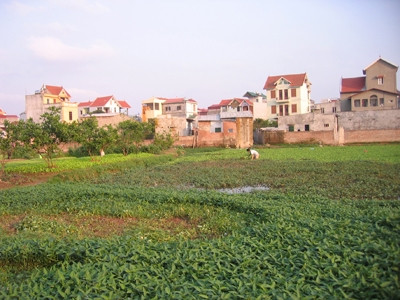New points on land recovery in the draft Land Law (amended)
Draft Land LawThe authority to reclaim land has been amended in the direction of stipulating that the Chairman of the People's Committee at the provincial and district levels has the authority to reclaim land instead of the People's Committee at the provincial and district levels as in the current Law, in order to attach responsibility to the head, creating favorable conditions to promote administrative procedure reform at the local level.

The draft Land Law (amended) specifically stipulates cases of land recovery, grounds for recovery, recovery authority, responsibility for organizing land recovery, responsibility for managing land funds after recovery, and land recovery procedures - Illustrative photo
Our country is in the stage of promoting industrialization and modernization of the country, so the requirement to develop infrastructure to create a foundation for economic development is very necessary.
Therefore, the Draft Land Law (amended) is being posted on the mass media to solicit public opinions to continue perfecting regulations on land recovery for use in national defense, security, national interests, public interests, economic and social development projects to suit practical requirements.
The draft Land Law (amended) specifically stipulates cases of land recovery, grounds for recovery, recovery authority, responsibility for organizing land recovery, responsibility for managing land funds after recovery, and land recovery procedures, specifically as follows:
Firstly, specifying cases of land recovery for use in national defense and security purposes (Article 59), national interests, public interests (Article 60), economic and social development projects (Article 61), land recovery due to violations of the law (Article 63), land recovery due to termination of land use according to law or voluntarily (Article 64) to ensure publicity and transparency in the implementation process at the local level;
Second, supplement the basis for land recovery according to each land recovery case (Article 62, Clause 2, Article 62, Clause 2, Article 64) to more closely manage land recovery at the local level; in which, land recovery, land allocation, land lease, and permission to change land use purposes must be based on the annual district-level land use plan, especially in the case of land recovery to implement economic and social development projects, it must also be based on the annual land recovery plan approved by the provincial People's Council (Clause 4, Article 43).
Third, supplement the regulation that before reclaiming rice fields, protective forest lands, and special-use forests for other purposes, there must be written approval from the Prime Minister (Clause 2, Article 50).
Fourth, amend the authority to recover land (Article 65) in the direction of stipulating that the Chairman of the People's Committee at the provincial and district levels has the authority to recover land instead of the People's Committee at the provincial and district levels as in the current Law, in order to attach responsibility to the head, creating favorable conditions to promote administrative procedure reform at the local level.
Fifth, supplement regulations to ensure feasibility for the State's land recovery mechanism according to the District Land Use Plan such as:
The land fund after recovery is assigned to the Land Fund Development Organization to organize compensation, support, and resettlement to create a "clean" land fund (Article 68). After that, the State allocates and leases land without allowing investors to participate in the land recovery process as prescribed in current regulations to regulate the difference in land prices before and after land recovery into the state budget; the responsibility for managing the recovered land fund in rural areas is not assigned to the People's Committee at the commune level as currently, but is uniformly assigned to the Land Fund Development Organization to ensure consistency and professionalism in exploiting the land fund after recovery.
Supplementing regulations on the operating mechanism of the Land Development Fund to ensure funding for land recovery (Article 106);
Regulations on the State's responsibility when constructing and expanding infrastructure works and urban beautification must include planning and organizing the recovery of land areas adjacent to infrastructure works and surrounding areas to create resources from land to invest in these works and support people whose land is recovered (Clause 3, Article 60);
Sixth, supplement regulations on procedures for land recovery, compensation, support, and resettlement when recovering land for use in national defense, security, national interests, public interests, and socio-economic development projects to ensure consistency, publicity, transparency, and limit impacts on the rights of land users by organizations that recover land locally, including procedures for land recovery according to land use plans (Article 69) and procedures for land recovery to allocate or lease land to investors (Article 70).
At the same time, the draft Land Law (amended) also adds provisions on enforcement in the measurement and inventory steps to develop a compensation plan before a land recovery decision is made (compulsory inventory) and enforcement of the land recovery decision (Article 71).
Seventh, supplement regulations on sanctions for cases of land recovery due to delay in putting land into use, such as the State not returning land use fees, land rent, and remaining land investment value to people whose land is recovered (Point h, Clause 1, Article 63).
With the fundamental innovations of the Land Law (amended) in general and the content of regulations on land recovery in particular, it is hoped that it will contribute to solving current difficulties and inadequacies in land management and use; reducing complaints, corruption and waste in land; improving the effectiveness and efficiency of state management of land; exploiting and sustainably using land resources, maximizing the potential and land resources to serve the country's economic development; meeting the requirements of international integration./.
According to (Chinhphu.vn) - LT
